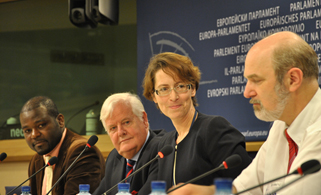Editorial by Rev. Jan Wessels
We had just arrived in Botswana and were visiting a settlement 40 kilometres from the main road from Gantsi town to Namibia. My colleague had started a small congregation there with mostly Naro San people. He was a huge athletic white South African, 2 metres tall, tanned by the Kalahari Desert sun and very charismatic.
Just before the church service we were standing outside the shade-netted structure with old Kristian: a 1m55 wrinkled and grey-haired bushman. He had been diagnosed with Tuberculosis, but the medicine wasn’t helping much. Every morning, he had to go to the clinic to get a handful of pills, but after taking them on an empty stomach he only felt more sick.
The trance-dance is one of the traditional healing practices of the San people: the whole community would come together in the evening, the women would clap and sing for the trance-doctors that would dance around the fire, until they would fall into a trance that would give them healing powers. Strange for us westerners, but absolutely intriguing.
“Ou Kristian”, my colleague started, “I heard that this week people have been dancing for you. How can you do that? Aren’t you a Christian?” All became very quiet. Everybody was looking at ‘Goliath’ and little ‘David’. Kristian slowly looked up to the pastor: “Moruti, you have only been here a few years and you have taught us about Jesus. But God was here already long before that time and we have been communicating with Him always. This was our way of praying to Him. Do you think your way of praying to God is better than ours?”
What is true prayer, true worship? I see it dividing the Church, the Body of Christ, and even the Evangelical movement to the bone. Is it Hillsong or Bethel music? Is it African worship or the solemn presbyterian way with old hymns, especially the psalms and an organ? Is it the rich tradition of the high Anglicans or the heavenly Orthodox liturgy? ‘Fortunately’, there is nowadays a lot to choose from and therefore it becomes just a matter of personal preference in a more and more individualistic culture. But is it really?
True worship – the question comes up in the conversation Jesus had with a woman at Jacob’s Well, near Sychar, on His way to Galilee (John 4:1-26). Jews would usually never take the road through Samaria, but this was God’s plan (vs. 4). The disciples had gone to the village to buy food – together, just to be safe – and had left Jesus at the well.
The woman must have been avoiding people, for she didn’t come at the normal hours to fetch water – early morning or late afternoon; she went at the hottest time of the day, and met Jesus, who breaks all the Jewish conventions (vs 9) by talking to her, a single Samaritan woman. In just a few words, Jesus turns her life upside down and inside out, revealing Himself as the Saviour and restoring this lost soul into a new life with God. She even becomes the first evangelist to Samaritans (vs 28).
While her faith is developing the question of worship arises. Where should she worship God: on mount Gerizim or in Jerusalem? The Jewish way or the Samaritan way? I cannot see this question as evasive or unserious, like it has been interpreted by many commentators. For this young believer, this must have been a real issue. How can she truly worship the living God that has just saved her from her life of misery and loneliness?
I often see this search and uncertainty among new believers. That is why discipleship is so crucial. Faith is not the end of a journey, but the start. Discipleship is a lifelong learning process. Make disciples by baptising them and continuously teaching them all I have commanded you, Jesus said to His disciples, in the Great Commission.
In response to the question of the Samaritan woman, Jesus answers that a new time is coming. Actually, had already come: with His coming and in Him. It is a new era that is breaking through, where it is not about places or buildings anymore, but about a real and personal relationship with God Himself through Jesus Christ and through the Holy Spirit.
‘True worship is worship in Spirit and in truth.’ In Spirit – for God is Spirit, Jesus explains (vs 24). As He is Light and Love, He is Spirit: above and beyond human or natural categories. He cannot be pinned down by buildings or institutions or dogmas. Already in the Old Testament this was a common understanding, though God’s people have always struggled with it. He is God and cannot be compared to anyone or anything.
In Spirit also means that only by the Holy Spirit we can ‘see’ Him, love Him, serve Him (1 Corinthians 12:3). That doesn’t make it difficult or even impossible, because God the Father will certainly give the Holy Spirit to those who ask Him (Luke 11:13). True worship therefore starts with praying for the Holy Spirit. It also doesn’t make it something vague, individual, or mystical like we see so many times today in all kinds of general religiosity and spirituality, or mindfulness, that is more self-centred than God-centred.
That is why true worship is worship in (the) Spirit and in Truth. I deliberately use Truth with a capital T, as this truth is not a set of doctrines. It is not a concept that can be discussed and accepted, but a person that is to be trusted and followed: Jesus is the Way, the Truth, and the Life (John 14:6). He came to bring grace and truth (John 1:17) by His death on the cross. And it is His Spirit, the ‘Spirit of Truth’, that will come – has come – to guide us into all the truth, because He will glorify Christ (John16:13-15).
True worship is therefore Spirit-filled and Christ-centred service to God that encompasses all of life. Not only your prayer life, or your church life. The apostle Paul writes in his letter to the Romans: Therefore, I urge you, brothers and sisters, in view of God’s mercy, to offer your bodies as a living sacrifice, holy and pleasing to God—this is your true and proper worship (12:1).
Practically, this means loving God with all your heart, with all your understanding and with all your strength, and loving your neighbour as yourself (Mark 12:33). Or in the well-known words of Micah: To act justly and to love mercy and to walk humbly with your God (6:8).
Ou Kristian was a simple Naro believer. An example for the people around him, taking care of his large extended family, making sure that his (grand)children would go to school and to church. I loved to have coffee with him and hear him tell stories. One of which was the story of how Jesus saved him, a simple bushman. His life showed the fruit of the Spirit in many rich colours and flavours. When he danced, he thought of and prayed to the God and Father of his Saviour. Who was I to judge his communication with God?
Den Haag, 24 August 2023
Image Credits: Photo by Mic Narra on Unsplash












